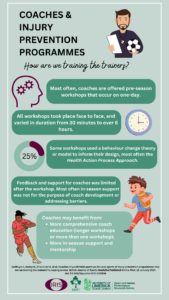Keywords: injury prevention; field sport; coach education; sport injury.
Our recently published scoping review aimed to summarise ‘train-the–trainer’ approaches to injury prevention programmes within field-sports (1). Essentially, we wanted to better understand what help, support and education sports coaches are offered to better serve the needs of these coaches and their players.
Why is this study important?
Copious attention has been paid to the creation of programmes to help sports coaches address the number of injuries their players sustain each season. For example, FIFA 11+ is designed with soccer players in mind. These programmes consist of a selection of exercises and drills that typically are used as a warm-up. Coaches are often the designated person ensuring players engage in these programmes alongside their other sport activities. We know that these injury prevention programmes are effective at reducing injury rates when they are completed 3 times per week (2), however the benefits of these programmes are diluted when players are not exposed to or do not engage with this programme as often (3). Coaches often provide reasons why they find it difficult to implement the programmes in the ‘real-world’ context and these include lack of time or lack of organisational support. In addition, coaches often cite barriers related to their own ability to deliver these programmes (4), so we examined how coaches are being supported in the adoption and delivery of these programmes.
How did the study go about this?
We searched for any studies that detailed how coaches were educated and supported to deliver injury prevention programmes to their teams. We looked specifically at coaches of younger athletes (aged 8 to 19) and coaches of field-sport athletes. We sought any information related to the logistics of the coach education (i.e. when it happened; where it happened); what content was included, or resources supplied; what informed the design of the coach education workshop; and if any coach-specific outcome measures were used. In the case where some of this detail wasn’t reported, we contacted the researchers directly to ask for more information.
What did the study find?
We found that most coach education workshops for this purpose take place at one time-point only (pre-season), with workshops varying in duration from 30 minutes to 6 hours. Coaches are rarely offered additional educational support in many instances in-season when they are trying to deliver these programmes; and this is often where bumps in the road are encountered. Some in-season support is being offered to coaches, but this is varied, typically occurs on an ad-hoc basis and is for the benefit of executing good research practice rather than for the primary purpose of helping coaches to develop their coaching ability. Lastly, we also found that only 25% of these coach education workshops explicitly cite a behavioural change model in designing their coach education. Behavioural change models consider the wide range of factors that influence behaviour change and so are useful when designing an intervention. The Health Action Process Approach was the most used model or framework in our included papers.
What are the key take-home points?
Currently, education for coaches to help in their delivery of injury prevention programmes is a once-off pre-season workshop with little or no implementation support or mentoring. Coaches may benefit from more comprehensive coach education, for example longer workshops or more than one workshop. There may also be benefit in the inclusion of in-season support that specifically seeks to help coaches such as the creation of communities of practice. Addressing some coach-specific barriers may help to maximise how often players are exposed to these programmes, and then, by extension, may positively impact their risk of injury.

Author and Affiliations:
Lauren Guilfoyle, Ian C. Kenny, Kieran O’Sullivan, Tom Comyns.
Lauren Guilfoyle, Department of Physical Education and Sport Sciences, University of Limerick, Limerick, Ireland.
References:
1.Guilfoyle L, Kenny IC, O’Sullivan K, et al. Coaches of youth field sports as delivery agents of injury prevention programmes: how are we training the trainers? A scoping review. British Journal of Sports Medicine 2024;58:144-154.
2. Faude O, Rössler R, Petushek EJ, et al. Neuromuscular adaptations to multimodal injury prevention programs in youth sports: a systematic review with meta-analysis of randomized controlled trials. Front Physiol 2017;8:791
3. Hislop MD, Stokes KA, Williams S, et al. Reducing musculoskeletal injury and concussion risk in schoolboy Rugby players with a pre-activity movement control exercise programme: a cluster randomised controlled trial. British Journal of Sports Medicine 2017;51:1140–6.
4. Barden C, Watkins R, Stokes KA, et al. Barriers and facilitators to implementing the activate injury prevention exercise programme – A qualitative study of schoolboy Rugby coaches. Int J Sports Sci Coach 2022;17:1317–30.